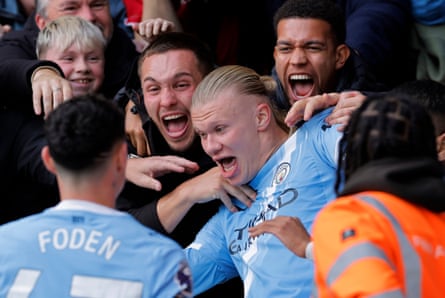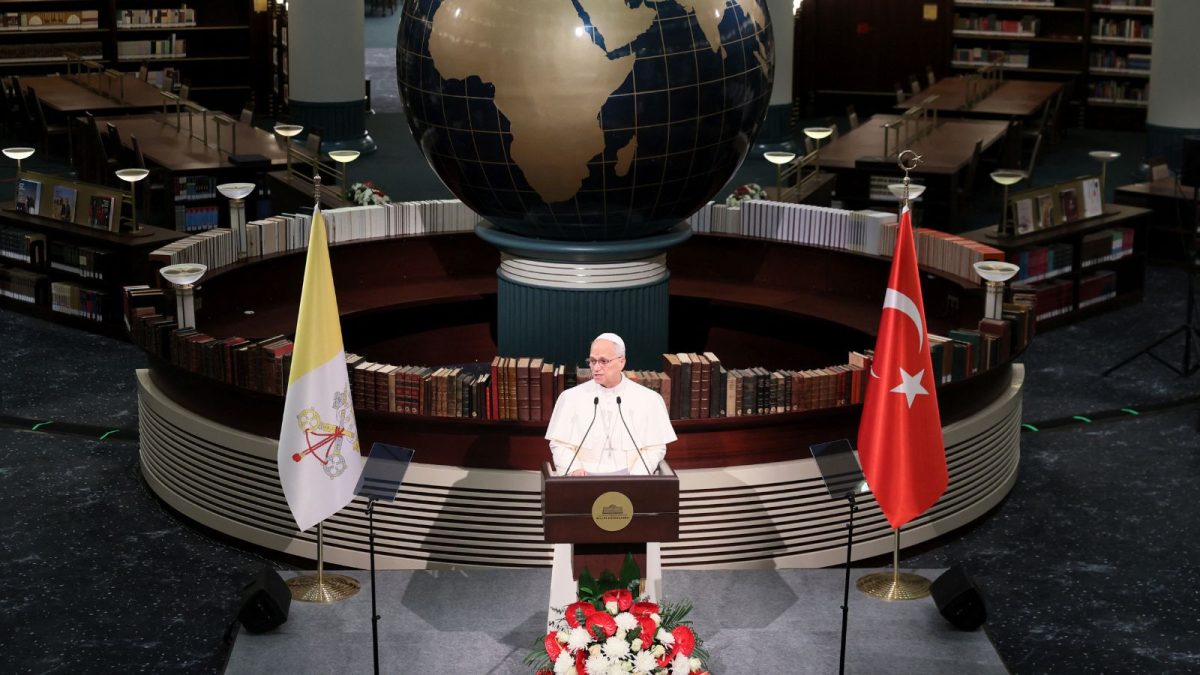Good morning. Last week, Kemi Badenoch made a bold promise to those attending Tory conference: “We can put the party in Conservative party.” Perhaps some veterans of Downing Street during the pandemic felt a thrilling pang of nostalgia. But as the conference got under way in Manchester yesterday, there weren’t a lot of champagne flutes being clinked.
Badenoch herself made the first of two appearances of the week, saying that she would take Britain out of the European convention on human rights (ECHR), and telling members that increasing deportations might require the party to go even further: “If there are other treaties and laws we need to revise or revisit, then we will do so.” But as that firmly rightwing policy implies, she is much too worried about the existential threat posed by Reform to be having any fun. And from here, the path back to a competitive position in the polls appears so treacherous as to be almost impassable.
So how did the Tories get here – and could another leader do any better? For today’s newsletter, I spoke to Sam Freedman, author of the excellent Comment Is Freed Substack, about how close the Conservative party is to having the lights switched on and the DJ pulling the plug. Here are the headlines.
Five big stories
Israel-Gaza war | Negotiators arrived in Cairo before talks on Monday expected to focus on the release of hostages held by Hamas in Gaza and a broader end to the war, as Israel continued strikes on the Palestinian territory, killing 63 people in 24 hours.
Protest | Civil liberty groups have expressed concerns at plans outlined by the home secretary to hand police greater powers to restrict protests as organisers of mass demonstrations against the banning of Palestine Action pledged a “major escalation” of their campaign.
China | Chinese officials threatened retaliation should the UK government target parts of its security apparatus under foreign influence rules soon after the Guardian reported it was under consideration.
Syria | The battle-ravaged country is holding its first parliamentary elections since the fall of its longtime ruler Bashar al-Assad, in a tentative step towards democratic polls that have been criticised as biased in favour of interim leaders.
Utilities | Millions of households in England face the prospect of even bigger water bill increases than originally expected, as the competition regulator prepares to give a preliminary verdict on industry spending plans as soon as this week.
In depth: ‘Too vulgar for the home counties, not populist enough for Reform voters’

The Conservatives are not alone among traditionally centre-right parties in Europe in being outstripped by their more radical rivals: versions of the same thing are happening in Italy, France, Germany and plenty of other countries besides. But that’s not much consolation for the self-styled “natural party of government” – and it doesn’t help with a solution to their basic bind: they are leaking voters on both sides of their coalition, with no obvious route to winning one set back without alienating the other.
“They’re still trapped in the same place – too vulgar for the home counties, not populist enough for Reform voters,” Sam Freedman said. “Kemi Badenoch is trying to hold the middle position. But that’s impossible, because it’s contradictory.”
Is Reform crushing the Tories a real possibility?
It’s more than a possibility: it’s the greatest threat to the future of the Conservatives as a viable governing party in modern political history. Recent polling has Reform as the most popular party in the country, bobbing around at 30%, while the Tories hover in the mid-teens; already, 14 former MPs and one incumbent – Danny Kruger (pictured above, with Farage) – have defected. The assumption is that others on the right of the party – maybe even would-be leader and perennial thorn in Badenoch’s side Robert Jenrick – are weighing their options.
In this smart primer on “the apparently terminal decline of the Conservative party”, Freedman lays out the conditions for total collapse: a serious challenger from the right, and “deep-seated institutional failure that prevents the besieged party from fighting back effectively”. That second condition is met by the hollowing out of local parties, financial difficulties at Tory HQ meaning that key teams have been cut back, and the gradual disillusionment of the rightwing press, which are now certainly Reform-curious. He goes on:
The most likely outcome – just about – remains that things carry on as now, with the Tories badly wounded but not quite dead, and splitting the vote on the right … But the possibility that the Conservatives will disintegrate has increased substantially since January because the Tories are so far behind Reform, and have seen their institutional structures eroded to the point where they could be toppled very quickly.”
The policies that Badenoch is now rolling out, such as her plans to leave the ECHR and repeal the Climate Change Act, are plainly targeted at winning back Reform voters. She has also advanced a more concerted set of attacks on Farage as economically illiterate in recent months. “But enthusiasm for Reform is so much higher than any other party,” Freedman said. “And a large chunk of their voters just hate the Tories, so they aren’t going to listen to criticism from people they don’t like.”
Is Kemi Badenoch up to the job?
Even if she received a warm welcome for her speech yesterday, poor PMQs performances, a curious period of policy silence and a series of excruciating gaffes have all contributed to a sense that MPs and party members think their leader is failing.
Badenoch laid out two defences for her performance to the Spectator last week: the party’s parlous financial position meant she was obliged to spend her early months on fundraising “just making sure we didn’t go bust”; and she underestimated how quickly Labour’s honeymoon would end, meaning that “we weren’t ready to start answering questions about where we were going”.
Those are “weak excuses”, Freedman said. Equally, though, it’s hard to imagine the party would be resurgent now had a different leader been chosen, like James Cleverly, on the more moderate wing of the party, or Jenrick, firmly to the right. “Cleverly might be in a different kind of trouble with more defections to Reform,” Freedman said. “With Jenrick you might have seen more dissatisfaction from the small band of remaining moderates. So it’s true that any leader would probably be struggling – the fundamental problem is that their brand is in the toilet.”
Local elections in May – when the Tories face a thumping, if you believe current polls, particularly in Wales and Scotland – are the most likely moment for a challenge, Freedman said. “I don’t have much sense of an appetite for a race among MPs … But if they get eviscerated, as looks likely, it would be pretty weird to keep her.”
What’s Robert Jenrick up to?
If Badenoch ever imagined the ambitious MP for Newark’s leadership hopes would be extinguished by his defeat last year, his apparently bottomless supply of red meat for rightwing voters, often well outside his justice brief, has presumably shattered her illusions. Maybe the most entertaining quote in Badenoch’s Spectator interview was her icy response to an observation about her rival’s policy pronouncements: “Yes,” she said. “But most of them are my thoughts repackaged.”
For now, though, she entirely lacks the political capital to give him the boot. “He has Badenoch in an incredibly weak position,” Freedman said. “He is obviously gunning for the leadership and freelancing on policy, but she can’t fire him from the shadow cabinet.”
Jenrick’s dilemma is whether to hang around in the hope of an imminent vacancy, or jump ship to Reform – where there is no prospect of the leadership unless Nigel Farage is hit by a bus – while he can still command the attention bestowed on an early mover. “It’s a really tough call for him,” Freedman said. “Part of the issue is that the more other people who defect from the right, the lower his chance of winning the leadership anyway. I don’t think he’s going to jump immediately, but if he stays, he might end up in a leadership contest he can no longer win.”
What is the mood in the party?
Funereal. “The party is pretty depressed,” Freedman said. “With the MPs, there’s just not a lot of activity. Badenoch doesn’t have an enthusiastic party behind her.”
The shadow cabinet, such as it is, now features a lot of MPs shadowing multiple roles with minimal staffing support because of the party’s financial difficulties, leaving many of them apparently overwhelmed. As for the party rank and file: there just aren’t that many of them, a key reason for the financial troubles, with 123,000 paying dues – 8,000 fewer than when Badenoch took the job, and far fewer than Reform or Labour.
The only ones holding on to any optimism, said Freedman, are those who are professionally obliged to do so: Badenoch and her advisers. “They are probably more confident than is justifiable that Reform will fall apart and they will be there to pick up pieces,” he said.
Is there a better strategy available?
At the end of a conversation that did not offer a lot of obvious upsides for the Tories, I asked Freedman: what strategy would you advise them to take, then? There was a pause, and then a fairly long “Hmmmm”. He pointed to a June opinion piece in the New Statesman by David Gauke, the one-nation Conservative and former justice secretary, arguing that the only path forward is “a confident assertion of centre-right values that distinguishes them from both the centre left and the populist right”.
“That’s what I’d like them to do, too,” said Freedman, a former adviser to Michael Gove. “But I’m not convinced it’s a successful strategy either, because they’ve already lost a lot of seats to the Lib Dems where it might appeal, and the Lib Dems don’t give seats up easily. It wouldn’t have much appeal at all in the seats where they’re fighting Reform. And there actually aren’t that many seats where they’re up against Labour. So there’s no obvious way out.” In which case, the headline on Gauke’s piece might be a clearer reflection of reality: “The centre-right is cooked.”
skip past newsletter promotionafter newsletter promotion
What else we’ve been reading

From the perspective of a middle-aged Brit, the New York dating scene has always seemed wild, and the decision by Juhea Kim (pictured above) to flee to France in search of love does nothing to dispel that notion. Toby Moses, head of newsletters
For Saturday magazine, the former Nato general secretary Jens Stoltenberg gives a riveting account of the meeting with Donald Trump that brought the alliance to the point of collapse. As he remembers thinking: “This might be the meeting at which Nato is ruined. And it’s happening on my watch.” Archie
Emma Beddington writes about the terrifying rise of the 996 work pattern (that’s 9am-9pm at the coalface, six days a week). Unsurprisingly, it’s tech bros leading the charge – I just hope my editors don’t get any ideas. Toby
It might seem a bit early for Lukas Gage – 30 years old, and honestly not that famous – to be writing a celebrity memoir. But as Tim Jonze’s interview makes clear, he has plenty to write about – and his story says a lot about the precariousness of showbusiness. Archie
The concept of “enshittification” – the idea that everything is getting worse – has become emblematic of our populist age. The writer behind the term, Cory Doctorow, takes aim at Amazon – once a handy bookshop, and now “filled up with self-immolating crapgadgets and other junk”. Toby
Sport

Football | Manchester City secured a 1-0 at Brentford thank to the relentless goalscoring prowess of Erling Haaland (pictured above). Elsewhere, Crystal Palace’s unbeaten start came to an end at Everton, with a late Jack Grealish goal winning it for the home side.
Formula One | George Russell won the Singapore Grand Prix for Mercedes, as McLaren secured their 10th Formula One constructors’ championship thanks to their two contenders for the driversLando Norris and Oscar Piastri.
Horse racing | The 104th Prix de l’Arc de Triomphe was won by Daryz, who caught favourite Minnie Hauk in the final moments.
The front pages

The Guardian print edition has as its lead story: “Alarm over minister’s plan to give police more anti-protest powers”. Similarly the Times runs with “Mahmood: police could get power to ban protests”. The i paper splashes as well on a policy balloon – “Reeves looks at budget tax hike on bank profits to raise billions” – as does the Express: “Tories pledge to slash £300bn cost of welfare”.
The Daily Mail reports: “PM’s security chief faces MPs’ grilling over China spy scandal”, while the Telegraph goes with “PM must ‘come clean’ over China say Tories”. “Don’t use our flag to divide us” – that’s Gary Neville on the front of the Mirror. The Metro reports on speeding up house buying with “Thump the gazumpers”. The Financial Times has a glint in its eye-catching headline: “Investors’ ‘gold-plated Fomo’ propels record-breaking surge in bullion price”.
Today in Focus

My dad, his ‘incurable’ disease, and hope at last
The Guardian journalist Josh Halliday talks about Huntington’s disease, the impact the rare inherited condition has had on his family and the hope there may now be a treatment.
Cartoon of the day | Edith Pritchett

Sign up for Inside Saturday to see more of Edith Pritchett’s cartoons, the best Saturday magazine content and an exclusive look behind the scenes
The Upside
A bit of good news to remind you that the world’s not all bad

“It’s basically a flying Batman bringing law and order to the city,” said the conservationist Dr Paul O’Donoghue, of the goshawks that have been newly introduced to Berlin. “They’re like stealth bombers.” Now the conservationist plans to release of 15 each of the apex predators sourced as chicks into Chester and London. He hopes they will come to the rescue of Britain’s beleaguered garden birds by preying on mesopredators such as crows, magpies and jackdaws, whose populations have grown unchecked and threatened birds further down the food chain. And there are benefits to humans. O’Donoghue pointed to the psychological benefit of Berlin residents being able to spot a predator as elusive as the goshawk while they go about their city lives.
Sign up here for a weekly roundup of The Upside, sent to you every Sunday
Bored at work?
And finally, the Guardian’s puzzles are here to keep you entertained throughout the day. Until tomorrow.

 1 month ago
1 month ago

















